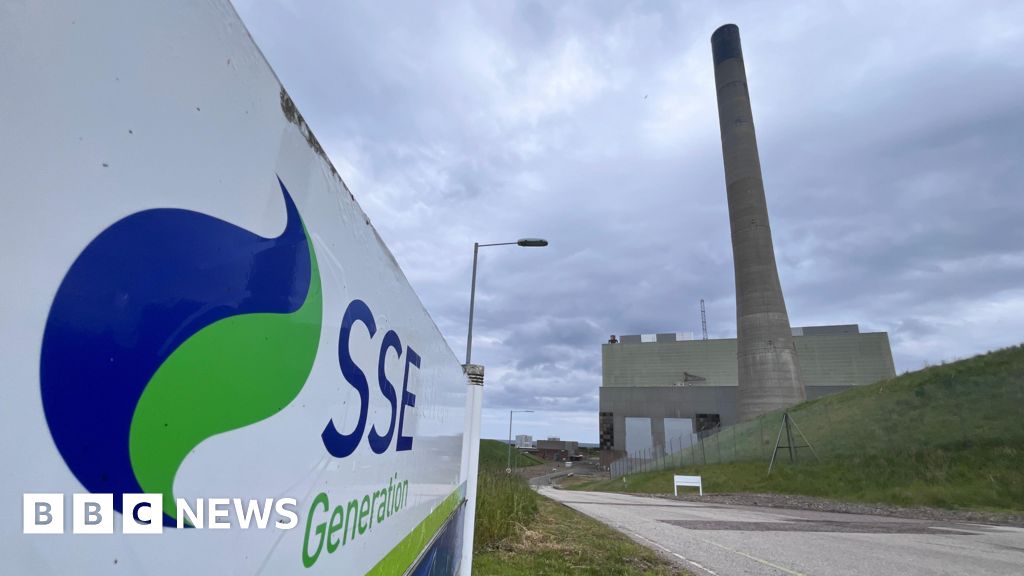Tech
Does Scotland need a new fosssil fuel power station? – BBC News

- Author, Kevin Keane
- Role, BBC Scotland’s environment correspondent
Scottish ministers are due to choose within months whether to give consent to build a new gas-fired power station on vacant land north-west of the existing one at Peterhead.
Environmental campaigners are against the move, saying there is no logical case for allowing a new fossil fuel power station to be built.
But supporters say new carbon capture technology could slash emissions from the new site by more than 90%.
They say Peterhead 2 would have a system that could capture planet-warming greenhouse gas emissions and send them via pipes from the power station to nearby St Fergus – where they would be injected into depleted oil wells under the North Sea about 50 miles offshore.
The current Peterhead facility has been generating electricity for more than four decades but it is now the last in Scotland to burn fossil fuels.
Kate Raffan has worked there as a chemist for 10 years and despite the long-term plan to wean Scotland off oil and gas, she did not think it was a bad move for her daughter to follow in her footsteps.
“It’s an exciting time for the youth of today to get involved,” she said.
“There are always skills to be learnt in every walk of this industry and they’re very transferable.”
Catriona, now 19, began a commercial and procurement apprenticeship three years ago and was worried about whether it was a wise decision.
But she now thinks fossil fuels could remain part of Scotland’s energy mix.
The imminent decision on Peterhead 2 is placing the SNP government in an awkward position, having previously opposed new oil and gas exploration in the North Sea.
A draft energy strategy contained a ‘presumption against’ new exploration but after pressure from within the party and the industry, that presumption could go.
Energy firm SSE says the new Peterhead power station will be built so that more than 90% of the carbon it creates through burning gas can be captured and stored.
But opponents dispute that claim, saying no carbon capture and storage (CCS) scheme has ever consistently trapped that much CO2.
They claim the new power station could double Peterhead’s greenhouse gas emissions for years.
Image source, Connal Hughes
Research by the Tyndall Centre for Climate Change Research has questioned the effectiveness of CCS technology in reducing greenhouse gas emissions from the energy sector.
Its study says existing projects across the world – of which there are only about 50 – usually target 90% of emissions at peak capacity with some falling as low as 65% in the early years of deployment.
The existing Peterhead power station has been the most polluting site in Scotland for the past five years, responsible for emitting 1.35 million tonnes of CO2 in 2022.
The Tyndall study was commissioned by environmental campaign groups Friends of the Earth Scotland (FoES) and Global Witness.
Caroline Rance, climate and energy campaigner at FoES, insists the new power station isn’t needed because renewables are already generating the equivalent of all Scotland’s electricity demands, with some excess being exported.
But aside from the environmental impact, she says that it’s “really bad for bills.”
She says: “We know that the cost of fossil fuels are driving up household bills and a new gas power station would just trap Scottish households into that same system for the next 25 years or more.”
Gas vs renewables
Some environmentalists argue that CCS should be reserved for industries like cement and steel production where it’s more challenging to find alternatives to fossil fuels which produce the super-high temperatures needed.
They say the electricity sector should focus instead on shifting to renewables like wind and solar.
But the Dundee-born chair of the Intergovernmental Panel on Climate Change (IPCC), Prof Jim Skea, has argued that CCS has an important role to play in energy generation.
He told the Financial Times that power stations could be the “anchor” source of carbon dioxide which make it economical to run CCS across larger industrial hubs.
That’s exactly the plan for the Scottish CCS cluster at St Fergus which will pull CO2 from the industrial heartlands around central Scotland such as Grangemouth and Mossmorran.
Finlay McCutcheon, managing director of SSE Thermal, which operates Peterhead power station, says gas provides a flexible means of generating electricity quickly when the National Grid needs it.
He said: “I don’t – and SSE doesn’t – believe that you can have a wholly renewable system.”
He added that energy storage, whether through large batteries or pumped storage hydro schemes, will play an important role during “extended periods” of low wind and solar generation.
While campaigners say carbon capture is a licence for oil producers to continue “business as usual”, the International Energy Agency (IEA) says rollout of it has been slow.
Climate campaigners are concerned that the new Peterhead power station – if it’s given the go-ahead – will be allowed to run for extended periods without the carbon being captured and stored – or that both the old and the new facilities will continue operating together.
They cite an SSE submission to the environmental regulator Sepa which says changes in national energy security because of the war in Ukraine mean they have to consider the possibility of not closing the old site when the new one opens.
The company denies this and says this is a “worse case scenario” but the intention is still to replace the current operation with ‘Peterhead 2’.
A Scottish government spokesperson said it would not be appropriate to comment on a live planning application, adding: “A decision will be taken by ministers in due course, following consideration of the application information, consultation responses and representations made by members of the public.”






